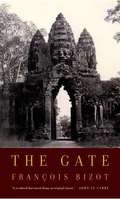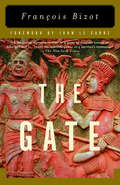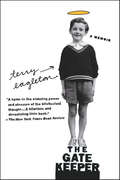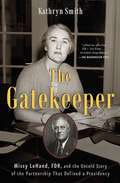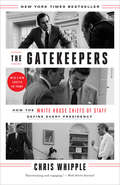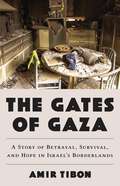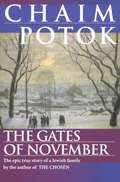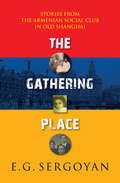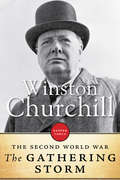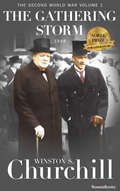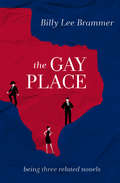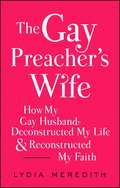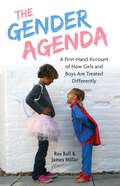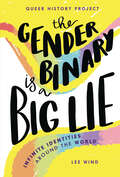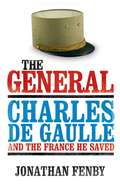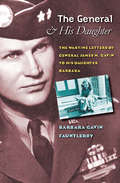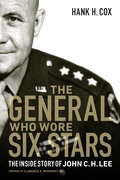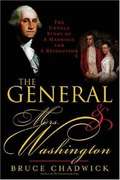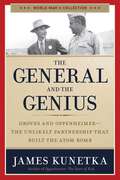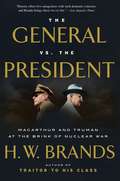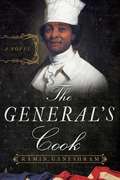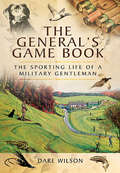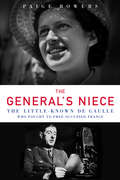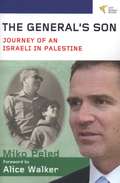- Table View
- List View
The Gate
by Francois Bizot Euan CameronWhat one man saw and did in a land of pristine beauty on the eve of one of the twentieth century's most barbaric spectacles.
The Gate
by Francois BizotIn 1971 a young French ethnologist named Francois Bizot was taken prisoner by forces of the Khmer Rouge who kept him chained in a jungle camp for months before releasing him. Four years later Bizot became the intermediary between the now victorious Khmer Rouge and the occupants of the besieged French embassy in Phnom Penh, eventually leading a desperate convoy of foreigners to safety across the Thai border. Out of those ordeals comes this transfixing book. At its center lies the relationship between Bizot and his principal captor, a man named Douch, who is today known as the most notorious of the Khmer Rouge's torturers but who, for a while, was Bizot's protector and friend. Written with the immediacy of a great novel, unsparing in its understanding of evil, The Gate manages to be at once wrenching and redemptive.
The Gatekeeper: A Memoir
by Terry EagletonOxford professor, best-selling author, preeminent literary critic, playwright, screenwriter, and novelist, Terry Eagleton knows all about the claims of competing worlds. One of his earliest roles growing up Catholic in Protestant England was as "the gatekeeper"-the altar boy who at reverend mother's nod literally closed the door on young women taking the veil, separating the sanctity of the convent from earthly temptations and family obligations. Often scathingly funny, frequently tender, and always completely engaging, The Gatekeeper is Eagleton's memoirs, his deep-etched portraits of those who influenced him, either by example or by contrast: his father, headmasters, priests, and Cambridge dons. He was a shy, bookish, asthmatic boy keenly aware of social inferiority yet determined to make his intellectual way. "Our aim in life," he writes of his working-class, Irish-immigrant-descended family, "was to have the words 'We Were No Trouble' inscribed on our tombstones." But Eagleton knew trouble was the point of it all. Opening doors sometimes meant rattling the knobs. At both Cambridge and Oxford, he gravitated toward dialectics and mavericks, countering braying effeteness with withering if dogmatic dissections of the class system.The Gatekeeper mixes the soberly serious with the downright hilarious, skewer-sharp satire with unashamed fondness, the personal with the political. Most of it all it reveals a young man learning to reconcile differences and oppositions: a double-edged portrait of the intellectual as a young man.
The Gatekeeper: Missy LeHand, FDR, and the Untold Story of the Partnership That Defined a Presidency
by Kathryn SmithThe “fine biography” and “compelling personal story” (The Wall Street Journal) of arguably the most influential member of Franklin Delano Roosevelt’s administration, Marguerite “Missy” LeHand, FDR’s de facto chief of staff, who has been misrepresented, mischaracterized, and overlooked throughout history…until now.Widely considered the first—and only—female presidential chief of staff, Marguerite “Missy” LeHand was the right-hand woman to Franklin Delano Roosevelt—both personally and professionally—for more than twenty years. Although her official title as personal secretary was relatively humble, her power and influence were unparalleled. Everyone in the White House knew one truth: If you wanted access to Franklin, you had to get through Missy. She was one of his most trusted advisors, affording her a unique perspective on the president that no one else could claim, and she was deeply admired and respected by Eleanor Roosevelt. With unprecedented access to Missy’s family and original source materials, journalist Kathryn Smith tells the “fascinating” (Publishers Weekly) and forgotten story of the intelligent, loyal, and clever woman who had a front-row seat to history in the making. The Gatekeeper is a thoughtful, revealing unsung-hero story about a woman ahead of her time, the true weight of her responsibility, and the tumultuous era in which she lived—and a long overdue tribute to one of the most important female figures in American history.
The Gatekeepers: How the White House Chiefs of Staff Define Every Presidency
by Chris WhippleNow with a new chapter on the chaos in the Trump administration, the first in-depth, behind-the-scenes look at the White House Chiefs of Staff, whose actions—and inactions—have defined the course of our country. What do Dick Cheney and Rahm Emanuel have in common? Aside from polarizing personalities, both served as chief of staff to the president of the United States—as did Donald Rumsfeld, Leon Panetta, and a relative handful of others. The chiefs of staff, often referred to as "the gatekeepers," wield tremendous power in Washington and beyond; they decide who is allowed to see the president, negotiate with Congress to push POTUS's agenda, and—most crucially—enjoy unparalleled access to the leader of the free world. Each chief can make or break an administration, and each president reveals himself by the chief he picks. Through extensive, intimate interviews with all seventeen living chiefs and two former presidents, award-winning journalist and producer Chris Whipple pulls back the curtain on this unique fraternity. In doing so, he revises our understanding of presidential history, showing us how James Baker&’s expert managing of the White House, the press, and Capitol Hill paved the way for the Reagan Revolution—and, conversely, how Watergate, the Iraq War, and even the bungled Obamacare rollout might have been prevented by a more effective chief. Filled with shrewd analysis and never-before-reported details, The Gatekeepers offers an essential portrait of the toughest job in Washington.
The Gates of Gaza: A Story of Betrayal, Survival, and Hope in Israel's Borderlands
by Amir TibonA gripping first-person account of how one Israeli grandfather helped rescue two generations of his family on October 7, 2023—a saga that reveals the deep tensions and systemic failures behind Hamas's attacks that day. On the morning of October 7, Amir Tibon and his wife were awakened by mortar rounds exploding near their home in Kibbutz Nahal Oz, a progressive Israeli community less than a mile from Gaza City. Soon, they were holding their two young daughters in the family&’s reinforced safe room, urging them not to cry as gunfire echoed just outside the door. With his cell phone battery running low, Amir texted his father: &“The girls are behaving really well, but I&’m worried they&’ll lose patience soon and Hamas will hear us.&” Some 45 miles north, Amir&’s parents had just cut short an early morning swim along the shores of Tel Aviv. Now, they jumped in their Jeep and sped toward Nahal Oz, armed only with a pistol but intent on saving their family at all costs. In The Gates of Gaza, Amir Tibon tells this harrowing story in full for the first time. He describes his family's ordeal—and the bravery that ultimately led to their rescue—alongside the histories of the place they call home and the systems of power that have kept them and their neighbors in Gaza in harm&’s way for decades. Woven throughout is Tibon's own expertise as a longtime international correspondent, as well as more than thirty original interviews: with residents of his kibbutz, with the Israeli soldiers who helped to wrest it from the hands of Hamas, and with experts on Gaza, the Israeli-Palestinian conflict, and the failed peace process. More than one family's odyssey, The Gates of Gaza is the intimate story of a tight-knit community and the broader saga of war, occupation, and hostility between two national movements—a conflict that has not yet extinguished the enduring hope for peace.
The Gates of November
by Chaim PotokFrom the author of The Chosen comes a work of nonfiction that chronicles the stormy lives of a Jewish father, Solomon Slepak, an infelxible old-guard Bolshevik, and his son, Volodya, who became an internationally renowned "refusenik" hero during the 18 years of his persecution for attempting to leave the Soviet Union. Potok tells their story with deep understanding and empathy.
The Gathering Place: Stories from the Armenian Club in Old Shanghai
by E. G. SergoyanArmenians who fled their homeland and migrated to Shanghai In the turbulent and horrific early twentieth century share nearly forgotten stories. In times of calamity or economic distress, only a small percentage (roughly two percent) of Armenian people are willing to leave their families, homes, and country to find a new life in exotic or foreign lands. Known as “two-percenters,” these are the refugees who made the arduous trek across Asia to gather in the exotic city of Old Shanghai, where they joined a social club in the city’s Old International Settlement. Its purpose was first to help refugees get settled, but it became a beloved place of community gathering. The Gathering Place centers on the stories of George and Nadine, two Armenian refugees who married and, after leaving China, made their way to the United States. Placed within the historical context of genocide, revolution, banditry, occupation, and two World Wars, their memories reflect the trauma of the first half of the twentieth century—a time referred to by some as the Modern Dark Age. Their stories of time and again building a new life in a foreign land offer a fresh take on the immigrant experience during a time of momentous change in Asia.
The Gathering Storm: The Second World War Volume 1 (The Second World War #1)
by Winston ChurchillThe Gathering Storm is the first volume in Winston Churchill’s The Second World War, a history of World War II from the end of the First World War to the conclusion of the second in 1945. Though Churchill wrote the history from his own perspective and held back necessary classified information, The Second World War is lauded as a fair and accurate account of war, and has remained one of the most important historical records of the military, political, and diplomatic realities in Britain at that time. Winston Churchill’s work on the six-volume series earned him the Nobel Prize for Literature in 1953.HarperTorch brings great works of non-fiction and the dramatic arts to life in digital format, upholding the highest standards in ebook production and celebrating reading in all its forms. Look for more titles in the HarperTorch collection to build your digital library.
The Gathering Storm: The Second World War, Volume 1 (Winston S. Churchill The Second World Wa #1)
by Winston S. Churchill&“It is our immense good fortune that a man who presided over this crisis in history is able to turn the action he lived through into enduring literature.&” —The New York Times This book is the first in Winston Churchill&’s monumental six-volume account of the struggle between the Allied Powers in Europe against Germany and the Axis during World War II. Told from the unique viewpoint of a British prime minister, it is also the story of one nation&’s heroic role in the fight against tyranny. Having learned a lesson at Munich they would never forget, the British refused to make peace with Hitler, defying him even after France had fallen and it seemed as though the Nazis were unstoppable. What lends this work its tension and power is Churchill&’s inclusion of primary source material. We are presented with not only Churchill&’s retrospective analysis of the war, but also memos, letters, orders, speeches, and telegrams, day-by-day accounts of reactions as the drama intensifies. We listen as strategies and counterstrategies unfold in response to Hitler&’s conquest of Europe, planned invasion of England, and assault on Russia. Together they give a mesmerizing account of the crucial decisions made as the fate of the world hangs in the balance. The Gathering Storm covers the Treaty of Versailles, the rise of Adolf Hitler, the capitulation of Munich, and the entry of Britain into the war. This book makes clear Churchill&’s feeling that the Second World War was a largely senseless but unavoidable conflict—and shows why Churchill earned the Nobel Prize in Literature in 1953, in part because of this awe-inspiring work.
The Gay Place: Being Three Related Novels (Texas Classics Ser.)
by Billy Lee Brammer&“The best novel about American politics in our time.&” —Willie MorrisSet deep in the heart of Texas, The Gay Place consists of three interlocking novels—The Flea Circus, Room Enough to Caper, and Country Pleasures—each with a different protagonist. Unifying the stories is Texas governor Arthur Fenstemaker, a canny master politician modeled on Lyndon Johnson, for whom the author served as a press aide. The governor uses any means necessary to do what needs to be done, while the other characters struggle with their conflicts of marriage and family, love and lust.Originally published in 1961, The Gay Place withstands the test of time—the themes of power, money, and family are eternally resonant. At once a political novel and a character study, Billy Lee Brammer&’s classic stands among the best novels about the Lone Star state.
The Gay Preacher's Wife: How My Gay Husband Deconstructed My Life and Reconstructed My Faith
by Lydia MeredithThe deeply personal memoir of Lydia Meredith, a woman who spent almost thirty years married to a preacher—only to have her husband leave her for a man—and how her life becomes a testimony of tolerance and a theology of love and acceptance.After being married to Reverend Dennis A. Meredith for almost thirty years, Lydia Meredith discovers a shocking truth: the love of her life left her for a man. Now, Lydia opens up for the first time about how that revelation shattered her world—and strengthened her faith. With her life turned upside down, Lydia struggled to put the pieces of her broken heart back together and that led her to pursue understanding through an accredited theological education. She wanted a way to put her family back together and she found Jesus&’ ministry and teachings were &“actually&” about teaching tolerance and love for people who are labeled different. Candid, honest, and incredibly touching, Lydia Meredith shows that faith and perseverance can get you through any challenge life throws your way.
The Gender Agenda: A First-Hand Account of How Girls and Boys Are Treated Differently
by James Millar Marianne Grabrucker Ros BallFrom language and clothes, to toys and the media, society inflicts unwritten rules on each gender from birth. Aiming to make people aware of the way gender is constructed and constantly reinforced, this diary chronicles the differences two parents noticed while raising their son and daughter. Adapted from tweets and blogs the couple kept throughout parenthood, this collection shows how culture, family and even the authors themselves are part of the 'gender police' that can influence a child's identity, and offers ideas for how we can work together to challenge the gender stereotypes that are ingrained in our society.
The Gender Binary Is a Big Lie: Infinite Identities around the World (Queer History Project)
by Lee WindWhat if you discovered that the whole concept of a gender binary is an illusion? While many people identify as men or women, that is not all there is. The idea that all humans fall into one of two gender categories is largely a construct created by those who benefit from that belief. The reality is that gender is naturally diverse, falling inside and outside of those boxes, and more expansive ideas of gender have always existed. In the second book of the Queer History Project, The Gender Binary Is a Big Lie: Infinite Identities around the World, author Lee Wind uses historical evidence and primary sources—poetry, ancient burial sites, firsthand accounts, and news stories—to explore gender roles and identities. Gender identities and physical bodies are as diverse as the human experience. Get ready to shatter those preconceived notions of nothing but a gender binary and dive deep into expressions of gender—both past and present—that reveal the infinite variety and beauty of everyone’s gender.
The General
by Jonathan FenbyNo leader of modern times was more unique and more uniquely national than Charles de Gaulle. As founder and first President of the Fifth Republic, General de Gaulle saw himself 'carrying France on my shoulders'. When he first emerged on to the world stage in 1940, his insistence that he spoke for his nation might well have appeared impossibly arrogant for a recently promoted junior general who had never been elected to anything. But he personified many of the traits of his country which fascinate the rest of the world - its pride in itself, its intransigence, its historical and cultural heritage and its quasi-religious belief in the state. Le Genéral, as he became known from 1940 on, appeared as if carved from a single monumental block, but was, in fact, extremely complex, a man with deep personal feelings and recurrent mood swings, devoted to his family and often seeking reassurance from those around him. Though insisting on discipline and loyalty from others, he was a great rebel. A grand visionary with a vast geo-political grasp and elephantine memory, he was also a supreme tactician with a taste for secrecy and the ability to out-flank opponents. This is a magisterial, sweeping biography of one of the great leaders of the twentieth century and of the country with which he so identified himself. Written with terrific verve and narrative skill, and yet rigorous and detailed, it brings alive as never before the private man as well as the public leader through exhaustive research and astute analysis.
The General & His Daughter: The Wartime Letters of General James M. Gavin to his Daughter Barbara (World War Ii: The Global, Human, And Ethical Dimension Ser.)
by Barbara Gavin FauntleroyThe fascinating personal correspondence from a commanding general of the eighty-second Airborne Division to his young daughter during World War II. James Maurice Gavin left for war in April 1943 as a colonel commanding the 505th Parachute Infantry Regiment of the eighty-second Airborne Division—America&’s first airborne division and the first to fight in World War II. In 1944, at age thirty-seven, &“Slim Jim&” Gavin, as he was known to his troops, became the eighty-second&’s commanding general—the youngest Army officer to become a major general since the Civil War. At war&’s end, this soldier&’s soldier had become one of our greatest generals—and the eighty-second&’s most decorated officer. In this book, James Gavin&’s letters home to his nine-year-old daughter, Barbara, provide a revealing portrait of the American experience in World War II through the eyes of one of its most dynamic officers. Written from ship decks, foxholes, and field tents—often just before or after a dangerous jump—they capture the day-to-day realities of combat and Gavin&’s personal reactions to the war he helped to win. With more than 200 letters spanning from Fort Bragg in 1943 to New York&’s victory parade, this collection provides an invaluable self-portrait of a great general, and a great American, in war and peace. Includes a prologue and epilogue by Barbara Gavin Fauntleroy; a foreword by Rufus Broadaway; commentary and notes by Starlyn Jorgensen; and an introduction by Gerard M. Devlin.
The General Who Wore Six Stars: The Inside Story of John C. H. Lee
by Hank H. Cox Clarence E. McKnight Jr.Lt. Gen. John C. H. Lee wore six stars on his helmet, three in front and three in back—an unusual affectation. He was a stickler for discipline and a legendary military figure whom servicemen and historians loved to hate. Yet Lee was an intensely religious person and an advocate of opportunity for African Americans in the era of Jim Crow, setting him apart from the conservative officer corps at this time. Lee was also responsible for supplying the Allied armies in Europe during World War II from D-Day through Germany’s surrender. In this long-overdue biography of the brilliant and eccentric commander, Hank H. Cox paints a vivid picture of this enormous logistical task and the man who made it all happen.The General Who Wore Six Stars delves into the perplexing details of how Lee let his idiosyncrasies get the better of him. This “pompous little son-of-a-bitch,” as some historians have called him, who was “only interested in self-advertisement,” famously moved his headquarters to Paris, where during the height of the American Army supply crisis, twenty-nine thousand of his Service of Supply troops shacked up in the finest hotels and, due to sheer numbers, created an enormous black market. Yet, Cox argues, Lee’s strategical genius throughout the war has been underappreciated not only by his contemporaries but also by World War II historians. The General Who Wore Six Stars provides a timely reassessment of this intriguing individual.
The General and Mrs. Washington: The Untold Story of a Marriage and a Revolution
by Bruce ChadwickA biography of the George and Martha Washington that establishes their place in history and captures their personalities and the deep love they had for each other. The stunning impact of their marriage on the Revolution is greater than you could have ever imagined. No biography of George Washington and his life together with his wife Martha has ever been published, and this is one of the great love stories. It tells their personal story, one often filled with tragedy. Martha had four children, George none. He became the stepfather to her offspring. Her daughter, an epileptic, died in his arms as he tried to save her. Their son Jackie, 28, a soldier, died at Yorktown from malaria. Several times in their life together, Martha saved George's life when he became mortally ill. She joined him in his winter camps to bring him comfort and grace. Every morning they would have breakfast together for one hour and the order was given that no one could interrupt them, no matter what the reason. Though the richest woman in Virginia, Martha joined her husband in his revolutionary cause. The book will also explain why these twopeople of considerable privilege committed acts of treason and rebelled against the King and England.
The General and the Genius: Groves and Oppenheimer ? The Unlikely Partnership that Built the Atom Bomb
by James KunetkaTwo ambitious men. One historic mission. With a blinding flash in the New Mexico desert in the summer of 1945, the world was changed forever. The bomb that ushered in the atomic age was the product of one of history's most improbable partnerships. The General and the Genius reveals how two extraordinary men pulled off the greatest scientific feat of the twentieth century. Leslie Richard Groves of the Army Corps of Engineers, who had made his name by building the Pentagon in record time and under budget, was made overlord of the impossibly vast scientific enterprise known as the Manhattan Project. His mission: to beat the Nazis to the atomic bomb. So he turned to the nation's preeminent theoretical physicist, J. Robert Oppenheimer--the chain-smoking, martini-quaffing son of wealthy Jewish immigrants, whose background was riddled with communist associations--Groves's opposite in nearly every respect. In their three-year collaboration, the iron-willed general and the visionary scientist led a brilliant team in a secret mountaintop lab and built the fearsome weapons that ended the war but introduced the human race to unimaginable new terrors. And at the heart of this most momentous work of World War II is the story of two extraordinary men--the general and the genius.
The General in His Labyrinth
by Gabriel García Márquez Edith GrossmanTale about Simon Bolivar, the general who dreamed of freeing South America from Spain.
The General vs. the President: MacArthur and Truman at the Brink of Nuclear War
by H. W. BrandsFrom master storyteller and historian H. W. Brands comes the riveting story of how President Harry Truman and General Douglas MacArthur squared off to decide America's future in the aftermath of World War II. At the height of the Korean War, President Harry S. Truman committed a gaffe that sent shock waves around the world. When asked by a reporter about the possible use of atomic weapons in response to China's entry into the war, Truman replied testily, "The military commander in the field will have charge of the use of the weapons, as he always has." This suggested that General Douglas MacArthur, the willful, fearless, and highly decorated commander of the American and U.N. forces, had his finger on the nuclear trigger. A correction quickly followed, but the damage was done; two visions for America's path forward were clearly in opposition, and one man would have to make way. Truman was one of the most unpopular presidents in American history. Heir to a struggling economy, a ruined Europe, and increasing tension with the Soviet Union, on no issue was the path ahead clear and easy. General MacArthur, by contrast, was incredibly popular, as untouchable as any officer has ever been in America. The lessons he drew from World War II were absolute: appeasement leads to disaster and a showdown with the communists was inevitable--the sooner the better. In the nuclear era, when the Soviets, too, had the bomb, the specter of a catastrophic third World War lurked menacingly close on the horizon. The contest of wills between these two titanic characters unfolds against the turbulent backdrop of a faraway war and terrors conjured at home by Joseph McCarthy. From the drama of Stalin's blockade of West Berlin to the daring landing of MacArthur's forces at Inchon to the shocking entrance of China into the war, The General and the President vividly evokes the making of a new American era.From the Hardcover edition.
The General's Cook: A Novel
by Ganeshram RaminPhiladelphia 1793. Hercules, President George Washington’s chef, is a fixture on the Philadelphia scene. He is famous for both his culinary prowess and for ruling his kitchen like a commanding general. He has his run of the city and earns twice the salary of an average American workingman. He wears beautiful clothes and attends the theater. But while valued by the Washingtons for his prowess in the kitchen and rewarded far over and above even white servants, Hercules is enslaved in a city where most black Americans are free. Even while he masterfully manages his kitchen and the lives of those in and around it, Hercules harbors secrets-- including the fact that he is learning to read and that he is involved in a dangerous affair with Thelma, a mixed-race woman, who, passing as white, works as a companion to the daughter of one of Philadelphia's most prestigious families. Eventually Hercules’ carefully crafted intrigues fall apart and he finds himself trapped by his circumstance and the will of George Washington. Based on actual historical events and people, The General's Cook, will thrill fans of The Hamilton Affair, as they follow Hercules' precarious and terrifying bid for freedom.
The General's Game Book: The Sporting Life of a Military Gentleman
by Major General Dare WilsonDare Wilson's sporting career dates back to 1920s when, as a small boy, he started fishing in Northumberland on River Derwent. Since then as he has pursued successful careers in the Army and Conservation, he has fished and shot all over the world; turkey hunting and snake catching in Georgia, pheasants in Korea, sand grouse and quail in Palestine, geese in Ireland, ducks in Manitoba.A natural story teller, General Wilson's sporting career almost ended while wildfowling in The Wash in early 1939 he, his Cambridge University friends and their dogs were saved by a miracle. An uninterrupted line of black Labradors have shared Dare's experiences. The current one, is the 12th. For good measure the General tells of his thrilling winter sports (skiing and cresta) and parachuting experiences. His team of SAS free-fallers broke the World Record in 1962 tragically one member died.Dare may have lived life on the edge but the risks he has taken have always been carefully calculated. Had they not been he would not still be an active fisherman and shot in his 90's. This is a treasure trove of sporting stories.
The General's Niece: The Little-Known de Gaulle Who Fought to Free Occupied France
by Paige Bowers"My dear Uncle Charles," twenty-two-year-old Geneviève de Gaulle wrote on May 6, 1943. "Maybe you have already heard about the different events affecting the family." The general's brother Pierre had been taken by the Gestapo; his brother Xavier, Geneviève's father, had escaped to Switzerland. Geneviève asked her uncle where she could be most useful—France? England? A French territory? When no response came immediately, she decided to stay in France to help carry out his call to resist the Nazis.Based on interviews with family members, former associates, prominent historians, and never-before-seen papers written by Geneviève de Gaulle, The General's Niece is the first English-language biography of Charles de Gaulle's niece, confidante, and daughter figure, Geneviève, to whom the legendary French general and president dedicated his war memoirs.Journalist Paige Bowers leads readers through the remarkable life of this young woman who risked death to become one of the most devoted foot soldiers of the French resistance. Beginning with small acts of defiance such as tearing down swastikas and pro-Vichy posters, she eventually ferried arms and false letters of transit to fellow résistants and edited and distributed the nation's largest underground newspaper, until she was arrested and sent to the infamous Ravensbrück concentration camp. The General's Niece reveals the horrors the young de Gaulle witnessed and endured there that could have broken her spirit but instead inspired her many remaining years of activism on behalf of former prisoners and of France's neediest citizens.Finally emerging from the shadow of her famous uncle, the life of this little-known de Gaulle adds a fascinating layer to the history of the second world war, including the French resistance, the horrors of and unshakeable bonds formed at Ravensbrück, and the issues facing postwar France and its leaders.
The General's Son: Journey of an Israeli in Palestine
by Miko PeledIn 1996, a tragedy struck the family of Israeli-American Miko Peled: His beloved niece was killed by a terror bomber in Jerusalem. That tragedy propelled Peled onto a journey of discovery and self-discovery, during which he met and became close to numerous other people, Israelis and Palestinians, who had similarly lost loved ones to the conflict between their peoples. Peled's journey echoed the trajectory taken 40 years earlier by his father, renowned Israeli general Matti Peled. But Miko Peled ended up at a different destination, as an outspoken supporter of a one-state outcome for Palestinians and Israelis with full civic equality between all citizens of the state. In this compelling memoir, Peled traces his journey-- from growing up in Jerusalem in the heart of the group that ruled the young country, Israel, through his military service and subsequent global travels; and then, after his niece's killing, back into the heart of Israel's conflict with the Palestinians. He provides an intimate window into the fears that haunt both peoples-- but also into the real courage of all those who, like himself, have been pursuing a steadfast grassroots struggle for equality for all the residents of the Holy Land.
